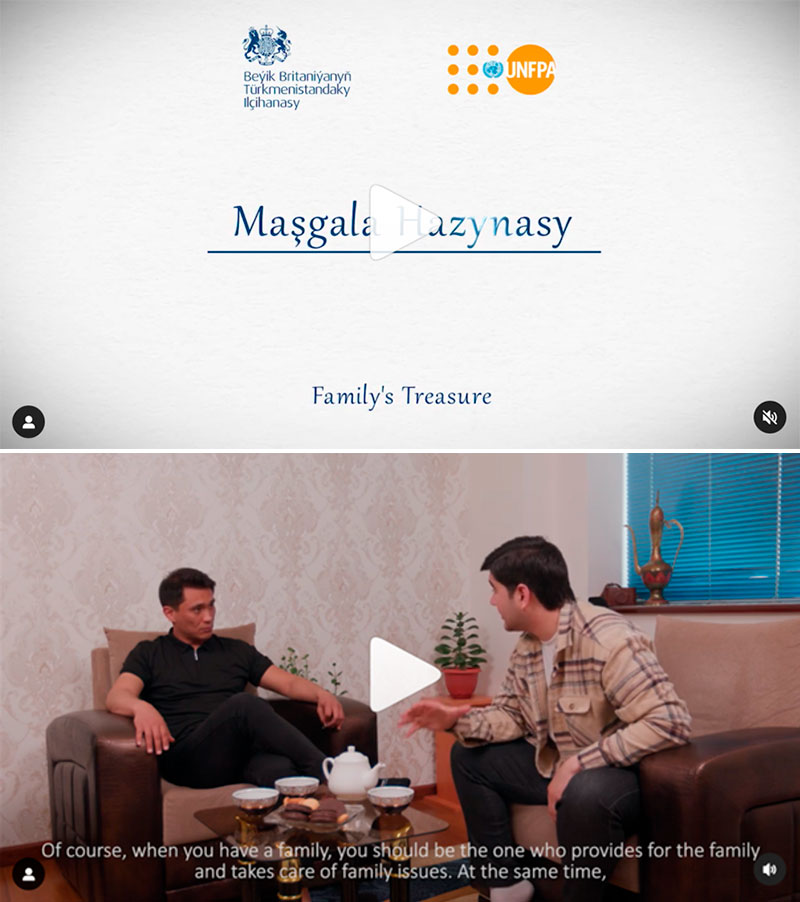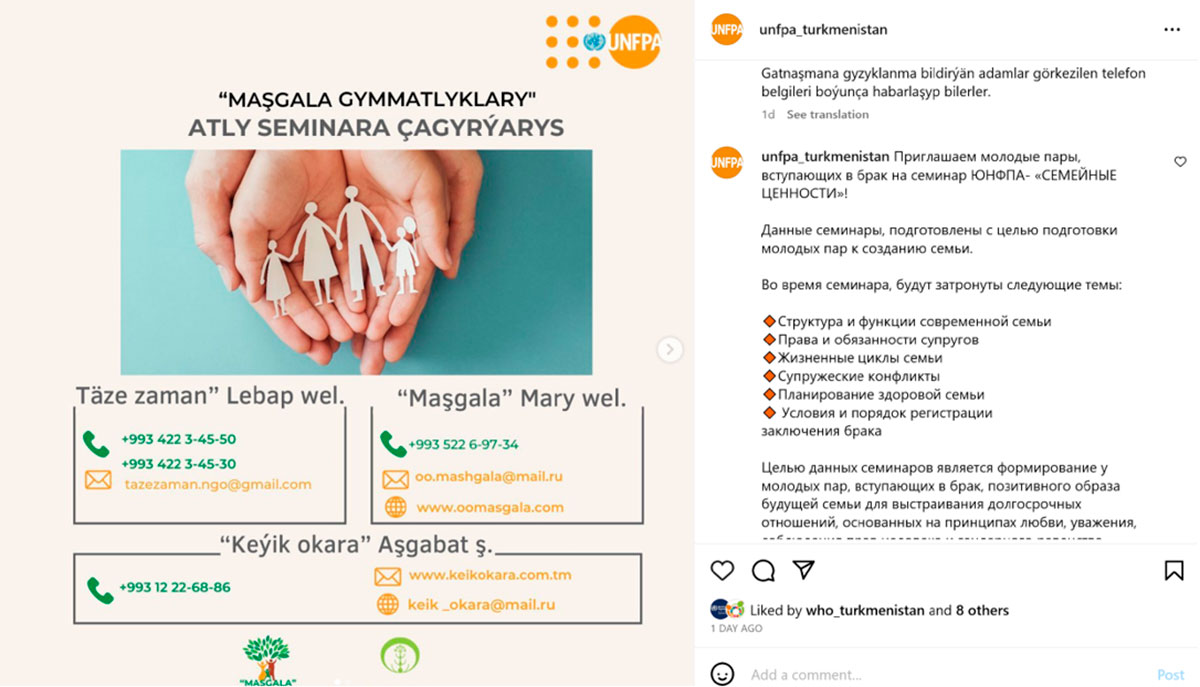Üns ber! Saýtyň esasy maksady Siziň saglyk babatdaky gözýetimiňizi giňeltmekdir. Şonuň üçin-de, saýtda berilýän maglumatlar esasynda öz-özüňi bejermek maslahat berilmeýär. Öz-özüňi bejermeklik düýpli kynçylyklara uçradyp, janyňyza howp salyp biler. Saýtdaky makalalar, materiallar we beýleki maglumatlar bilim maksatly bolup, lukmanyň bejergisiniň ýa-da maslahatynyň ýerini tutup bilmeýär.
UNFPA TURKMENISTAN’S PUBLIC EDUCATION ON FAMILY DAY
 UNFPA Turkmenistan ran an informational campaign on its Instagram account dedicated to the International Day of Families between May 15-17, 2023. It is good that UNFPA Turkmenistan is working to challenge societal norms and to foster a culture of equality, mutual respect, and shared responsibility. These are constructive efforts that can contribute to the development of a more inclusive society in Turkmenistan.
UNFPA Turkmenistan ran an informational campaign on its Instagram account dedicated to the International Day of Families between May 15-17, 2023. It is good that UNFPA Turkmenistan is working to challenge societal norms and to foster a culture of equality, mutual respect, and shared responsibility. These are constructive efforts that can contribute to the development of a more inclusive society in Turkmenistan.
At Saglyk, we have been developing content on family planning, sexual and reproductive health for the past 13 years. We would like to offer suggestions to UNFPA to help shape future public informational campaigns.
A gallery of irrelevant and generic information
UNFPA Turkmenistan's International Families Day campaign comprises 12 social media posts aimed at celebrating the diversity of families, promoting gender equality, confronting social norms and understanding the need for family support, in addition to raising awareness about family-related issues.
However, only one post attempts to raise a country-specific issue. The remaining posts contain generic information and statistics that may not be helpful for readers in Turkmenistan seeking to learn about, understand and engage with developments in their own society and country. Below are a few examples of what we mean.

UNFPA Turkmenistan should have used research and data that it funds on Turkmenistan. Their research includes some country-specific data, but UNFPA seems hesitant to use the data it generates to message the public. The reasons for this are unclear, leading to speculation among the public.
Report on the Status of Women in the family Turkmenistan
Study of unmet need in family planning in Turkmenistan
Videos with self-censoring speakers: What does "family" mean for you?
There are several videos where random Turkmens speak about what "family" means to them. It is encouraging to see Turkmens speaking publicly, something they used to avoid. Unfortunately, the videos are lacking reflection and understanding of the issues that the average Turkmen is currently facing, making them appear staged. Devoid of context, these messages might be good and safe to say on all continents without resonating with any listener.
A key part of the campaign was an educational video titled "Family’s Treasure", emphasizing UNFPA's efforts to highlight the value of every family member and challenge harmful norms. Created in partnership with the British Embassy Ashgabat, the video advocates gender equality and promotes shared responsibility in unpaid care and household work.
It looks like a lot of resources, time has been spent on creating the video and unfortunately only about 75 people "liked" it (as of May 24). The story in the video raises interesting questions, but it is too long, comes across as an unengaging instructional piece and lacks cultural tailoring. This is unfortunate.

It will be very hard for a Turkmen who has no idea, familiarity with the concept of economic cost of domestic chores to understand and to hear the message. Moreover, it appears as though a husband and his friend are deciding on the future of his wife who had to abandon her dream to become a doctor many years ago to become a homemaker. Overall, the delivery of the message and its length makes it look less natural and more staged. The momentum has been lost.
The final scene shows the husband acknowledging the economic costs of his wife’s household chores and tells her that "from now on, we will do all chores together" to which she asks "what will I do then?" and with this deep-seated mentality of strict division of responsibilities in the family, the husband quickly tells her to follow her long lost dream of becoming a doctor. This is very problematic. Change does not happen this quickly, particularly in our closed country that is insulated from other cultures, behaviors and thinking.
To enhance messaging in future campaigns, we offer the following recommendations:
1. More representation: While this video is a great start, it might be beneficial to include more diverse representations in future campaigns. For example, consider portraying different types of families, ethnic groups, or socioeconomic classes within Turkmenistan. This will help reach a wider audience and show that these issues and potential solutions apply to everyone.
2. Involve stakeholders: The video shows a conversation between friends, which is a good start. Still, the campaign could involve other influential figures in the community, like elders, teachers, or specialists, who have significant influence in traditional societies. They can serve as advocates for change.
3. Raising the issue of bride price: The popular cultural practice of "galyň" (bride’s price) has survived and has been successfully practiced in somewhat evolved format in the context of consumer culture, women’s unemployment and poor access to educational opportunities. This means that there is an understanding in society among some men that "I paid the high bride price and I deserve good services from my wife". Addressing this issue will resonate well within the general public, particularly youth and raise awareness about this harmful practice.
4. Measure impact and adapt: Implement a system to measure the impact of the campaign. Surveys or polls could be used to understand how the audience's perceptions are changing. Use this feedback to adapt and improve future campaigns.
Government and UNFPA’s "family values" workshops for young couples

The initiative by UNFPA Turkmenistan to organize a seminar for young couples aimed at discussing significant topics such as modern family structure, rights and responsibilities within marriage, family planning, conflict resolution, and the procedural aspects of marriage registration is a commendable endeavor.
These workshops have a lot of potential to be appealing and useful for youth if they are marketed and messaged in a different, less strange and threatening way. Firstly, since the perception and trust in government-run programs might be less than ideal among the target audience, one feasible solution could be to engage non-profit organizations that might enjoy greater trust and credibility among the public. The goal is to transition from a direct government-run seminar to one that's managed by civil society. This could help alleviate some apprehension and result in higher public participation.
Secondly, the promotional approach for the seminar can be improved. It is important to ensure that the messaging is approachable, inviting, and clearly communicates the benefits of the program. Instead of framing it as a "government-run program", it could be positioned as a resourceful workshop where participants can share experiences, learn from experts, and gain practical insights that will be beneficial in their personal lives.
Thirdly, transparency and ease of access should be given more importance. We do not know anything about its content. The information about how, by whom and in what format the seminar will be conducted should be shared publicly in advance, possibly in the form of an agenda or a brief outline, to give potential participants an idea of what to expect. This could help build anticipation and interest.
Lastly, the mode of communication and logistics could be streamlined. The poster asks you to call the numbers to participate and there is no date for the workshop in the poster. Given the understanding of the Turkmen public's viewpoint towards international organizations and their confidence level in government-run programs, it becomes self-evident that only a small number of individuals would be inclined to call and participate in the workshops. A simple process of online registration might encourage more people to participate. The date and time of the workshop should also be clearly mentioned in the promotional materials, allowing potential participants to plan their attendance in advance.
In conclusion, while the initiative is noteworthy, enhancing transparency, improving promotional messaging, utilizing credible platforms, and simplifying registration procedures could potentially make future seminars more effective and genuinely liked by the young people in Turkmenistan.
- 1837 gezek okalan
